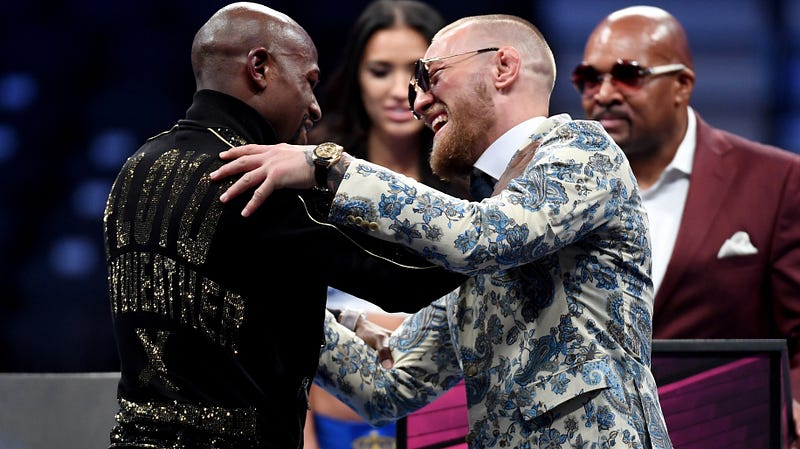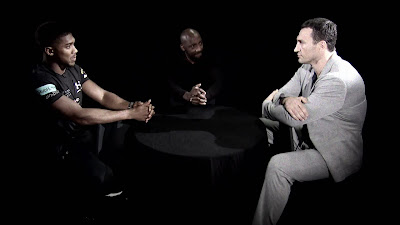In what was billed as one of the biggest sporting events in history, Floyd Mayweather vs Conor McGregor has come and gone. It’s undoubtedly broken PPV records and generated a level of hype beyond that seen in either boxing or MMA thanks to all the casual interest. All involved with the event are also walking away with epic paydays. Indeed, as a friend put it, McGregor is walking away from his debut with a record of 0–1 yet with more cash than many fighters see in their entire careers. And Mayweather, who took the lion’s share of the revenue, of course walks away with his 50th W on his record complemented by 0 losses.

The fight played out largely as expected. That is of course if you weren’t a McGregor fanboy, or sections of the MMA media, whose skewed analysis and narrative were without doubt the most irksome aspect of the fight’s build up (that’s not referring to actual MMA fans who unlike the aforementioned actually took a measured and knowledgeable approach and analysis to the fight).
Most anticipated Mayweather would take a few rounds to shake off any ring rust, gauge McGregor’s game plan and establish his range. Consequently, he’d become more elusive to McGregor’s offensive, adopt a strategy of attrition and start landing shots at will to close the show. Despite McGregor being stopped in round 10, Mayweather could arguably have put those combinations together from round 6, when McGregor was now clearly fatigued, and with the same conclusion.
For his part, McGregor didn’t present himself as Mayweather fodder en route to a pay day. He came to another man’s sport and fought under Queensbury rules. He showed a solid chin and above all a self-belief that was second to none in contrast to Mayweather’s previous opponents. He really felt he could cause an upset and convinced many people of it too. Despite being immovable from a likely victory for Mayweather, I admittedly found McGregor’s self-belief and master salesmanship incredibly convincing. Nevertheless, he was fighting a pound for pound great in a sport that he had no professional experience in.
It would be remiss to dismiss his pedigree and success as a fighter, let alone to not expect some of that to transfer to his preparations for Mayweather. But this is boxing and like any sport there are levels. And a novice to the sport, just as a boxer would be in MMA, simply isn’t on the level of a pound for pound former champion, even in retirement. So what did we actually learn from this fight? The answer is not much that we didn’t already know.
Both fighters’ compelling promotion prevented logic prevailing for the deluded factions of the McGregor supporters who felt this was a 50–50 fight or worse still that Mayweather would fall victim to McGregor’s left hand. What they failed to appreciate was that the fight was on Mayweather’s turf of boxing. Aside from an unorthodox style that would require a few rounds to read, there wasn’t anything McGregor could bring to the fight that Mayweather either hadn’t already experienced or didn’t know how to neutralise.
To think otherwise was what caused the ire of so many of the boxing fraternity. They felt their sport wasn’t being respected by MMA fans insofar as the belief that a novice would be able to do what 49 others, who had dedicated their lives and careers to the sport, were unable to achieve.
As a result, many viewed this fight as boxing vs MMA, a notion as inequitable as sprinting vs long distance running or rugby vs football. Simply because the respective disciplines may present some commonality, that doesn’t make such direct comparisons viable. I’m sure McGregor knew this yet dared to dream for which he should be commended. Alas, many others did not.
The internet will be a better place without the fanboys whose comments, void of objectivity and full of ignorance, have littered comment sections and social media since this fight was announced. Unfortunately, still not convinced that their man was conclusively defeated, some still remain delusional.
The same goes for sections of the media. As boxing journalist Steve Bunce commented of the MMA press, some reports would suggest that McGregor’s training had transformed him “from raw novice boxer to some type of creation that is part Stephen Hawking and part Clubber Lang.” If anything, the subsequent result will perhaps in future inject some reality into such sentiments.
The dust has settled and both fighters are even richer than they already were. McGregor may not have achieved the unthinkable, in what was a lofty yet admirable aspiration. Although he has earned the respect of a boxing fraternity that has long held a chip on its shoulder with the success of MMA as a fellow combat sport.
McGregor was noble and gracious in defeat and showed respect to the sport that provided the landscape for his loss. His profile has also risen in the mainstream without an adverse effect on his stock within the UFC. Mayweather, who had less to gain besides the pay day, also leaves with his legacy unscathed and a 50th, yet meaningless (given the opposition), W on his record.
As for the spectators, they were provided with an event full of fanfare and an uneventful fight that could have been worse. And were they hoodwinked? Probably not. The outcome was there for everyone to realise from the outset. It just depends on what they chose to see.

The fight played out largely as expected. That is of course if you weren’t a McGregor fanboy, or sections of the MMA media, whose skewed analysis and narrative were without doubt the most irksome aspect of the fight’s build up (that’s not referring to actual MMA fans who unlike the aforementioned actually took a measured and knowledgeable approach and analysis to the fight).
Most anticipated Mayweather would take a few rounds to shake off any ring rust, gauge McGregor’s game plan and establish his range. Consequently, he’d become more elusive to McGregor’s offensive, adopt a strategy of attrition and start landing shots at will to close the show. Despite McGregor being stopped in round 10, Mayweather could arguably have put those combinations together from round 6, when McGregor was now clearly fatigued, and with the same conclusion.
For his part, McGregor didn’t present himself as Mayweather fodder en route to a pay day. He came to another man’s sport and fought under Queensbury rules. He showed a solid chin and above all a self-belief that was second to none in contrast to Mayweather’s previous opponents. He really felt he could cause an upset and convinced many people of it too. Despite being immovable from a likely victory for Mayweather, I admittedly found McGregor’s self-belief and master salesmanship incredibly convincing. Nevertheless, he was fighting a pound for pound great in a sport that he had no professional experience in.
It would be remiss to dismiss his pedigree and success as a fighter, let alone to not expect some of that to transfer to his preparations for Mayweather. But this is boxing and like any sport there are levels. And a novice to the sport, just as a boxer would be in MMA, simply isn’t on the level of a pound for pound former champion, even in retirement. So what did we actually learn from this fight? The answer is not much that we didn’t already know.
Both fighters’ compelling promotion prevented logic prevailing for the deluded factions of the McGregor supporters who felt this was a 50–50 fight or worse still that Mayweather would fall victim to McGregor’s left hand. What they failed to appreciate was that the fight was on Mayweather’s turf of boxing. Aside from an unorthodox style that would require a few rounds to read, there wasn’t anything McGregor could bring to the fight that Mayweather either hadn’t already experienced or didn’t know how to neutralise.
To think otherwise was what caused the ire of so many of the boxing fraternity. They felt their sport wasn’t being respected by MMA fans insofar as the belief that a novice would be able to do what 49 others, who had dedicated their lives and careers to the sport, were unable to achieve.
As a result, many viewed this fight as boxing vs MMA, a notion as inequitable as sprinting vs long distance running or rugby vs football. Simply because the respective disciplines may present some commonality, that doesn’t make such direct comparisons viable. I’m sure McGregor knew this yet dared to dream for which he should be commended. Alas, many others did not.
The internet will be a better place without the fanboys whose comments, void of objectivity and full of ignorance, have littered comment sections and social media since this fight was announced. Unfortunately, still not convinced that their man was conclusively defeated, some still remain delusional.
The same goes for sections of the media. As boxing journalist Steve Bunce commented of the MMA press, some reports would suggest that McGregor’s training had transformed him “from raw novice boxer to some type of creation that is part Stephen Hawking and part Clubber Lang.” If anything, the subsequent result will perhaps in future inject some reality into such sentiments.
The dust has settled and both fighters are even richer than they already were. McGregor may not have achieved the unthinkable, in what was a lofty yet admirable aspiration. Although he has earned the respect of a boxing fraternity that has long held a chip on its shoulder with the success of MMA as a fellow combat sport.
McGregor was noble and gracious in defeat and showed respect to the sport that provided the landscape for his loss. His profile has also risen in the mainstream without an adverse effect on his stock within the UFC. Mayweather, who had less to gain besides the pay day, also leaves with his legacy unscathed and a 50th, yet meaningless (given the opposition), W on his record.
As for the spectators, they were provided with an event full of fanfare and an uneventful fight that could have been worse. And were they hoodwinked? Probably not. The outcome was there for everyone to realise from the outset. It just depends on what they chose to see.














